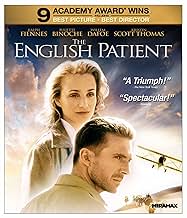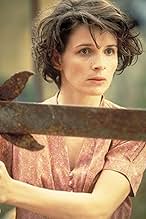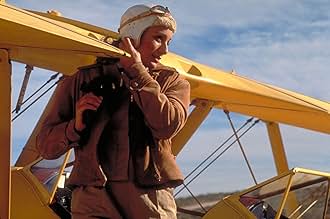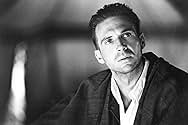Am Ende des Zweiten Weltkriegs kümmert sich eine Krankenschwester um ein Flugzeugabsturzopfer mit schweren Verbrennungen. In Rückblenden enthüllt sich seine Vergangenheit, als er in eine ver... Alles lesenAm Ende des Zweiten Weltkriegs kümmert sich eine Krankenschwester um ein Flugzeugabsturzopfer mit schweren Verbrennungen. In Rückblenden enthüllt sich seine Vergangenheit, als er in eine verhängnisvolle Liebesaffäre involviert war.Am Ende des Zweiten Weltkriegs kümmert sich eine Krankenschwester um ein Flugzeugabsturzopfer mit schweren Verbrennungen. In Rückblenden enthüllt sich seine Vergangenheit, als er in eine verhängnisvolle Liebesaffäre involviert war.
- Regie
- Drehbuch
- Hauptbesetzung
- 9 Oscars gewonnen
- 62 Gewinne & 78 Nominierungen insgesamt
Empfohlene Bewertungen
I always appreciated this movie, although the genre is not my typical style (I never watched Titanic for instance, and am not planning to).
The English Patient grips because it shows how people can be different when they are in an exotic environment as opposed when they are 'home' (Katherine), it shows how destructive love can be in a slow, strong and utterly painful way, it excites because of the extremely passionate affair, the pain of the one(s) who leave behind, how pointless one can feel to move on.
The photography is just stunning, not to mention the play of the actors. The pace is slow, but timely, and that does justice to the book, the timeline, and the depth/development of the characters. To put this in 110 minutes (as some seem to suggest here) would amputate the multi-layeredness of this movie. People tend to have difficulties with the pace of movies... as if they are in a rush to get to work.. hey - get a life ! ;-) enjoy...
I give this movie 4.5 out of 5.
The English Patient may be a slow movie, with all the dates, character relationships and events unfolding at a purposefully leisurely pace, but it is also intensely moving, beautifully shot and compelling. The film looks stunning, the dessert scenes especially are reminiscent of the epic sweeping feel that Lawrence of Arabia had. The cinematography is incredibly beautiful, and the costumes and scenery are wonderfully lavish and evoke the period seamlessly. The English Patient has a truly haunting and heart-wrenching score, particularly in the end credits, complete with some fitting music choices. The film also has a poetic and thought-provoking script, a compelling story that conveys the characters' predicaments wonderfully complete with flashbacks that enhance rather than jar and superb direction by the late and very talented Anthony Minghella.
The English Patient has a strong emotional impact as well, the climatic sequence in particular moved me to tears that stayed long after the movie was over. The characters are richer and more complex than one might think, Almasy especially is very haunted and pained, and dealt with in an incredibly subtle way. The acting does perfect justice to these characters, Ralph Fiennes is absolutely brilliant in one of his best and more complex performances(I'd say only Schindler's List is better), and Kristen Scott Thomas shows a great chemistry with him, the scene where she is carried out of the cave by him is one of extreme pathos. Juliette Binoche is equally affecting, and Willem Dafoe and Kevin Whately are as strong as ever.
All in all, a moving and beautiful film, cinematically and emotionally. 9/10 Bethany Cox
It's WWII; flying above the African desert, Hungarian Count Laszlo de Almasy (Ralph Fiennes) is shot down, his biplane mistaken for an enemy aircraft. And though he survives the crash, he is severely burned. To his great good fortune, however, he is rescued by a tribe of nomads and winds up in a hospital. But existing conditions are governed by circumstances of war, and Almasy soon becomes one of many patients being transported via convoy to a different facility. Upon reaching Italy, he is too weak and ill to continue on, and a Canadian nurse, Hana (Juliette Binoche), volunteers to stay behind with him at an abandoned monastery.
Hana soon discovers that her charge is something of a man of mystery, as Almasy remembers nothing of his past, and not even his own name. Thought to be English, the only clues pointing to who he is are contained in a book found in his possession after the crash, but even they are as cryptic as Hana's patient. Slowly, however, under prompting from Hana, Almasy begins to remember bits and pieces of his life, and his story begins to unfold. And his memory is helped along even more by the appearance of a mysterious stranger named Caravaggio (Willem Dafoe), who suspects that Almasy is the man he's been looking for-- a man with whom he wants to settle a score. But, burned beyond recognition, Almasy may or may not be that man. Meanwhile, Almasy's memories continue to surface; memories of a woman he loved, Katherine Clifton (Kristin Scott Thomas)-- as well as memories of Katherine's husband, Geoffrey (Colin Firth). And, crippled in mind and body as he is, those memories become the only thing left to which he can cling with any hope at all, even as his life seems to be slipping farther away with each passing moment.
In addition to directing, Anthony Minghella also wrote the screenplay for this film, which he adapted from the novel by Michael Ondaatje. The result is an epic saga presented in the tradition of Lean's `Doctor Zhivago' and `Lawrence of Arabia'; a magnificent film that fills the screen and the senses with unprecedented grandeur and beauty. Simply put, Minghella's film is genius realized; crafted and delivered with a poetic perfection, watching it is like watching a Monet come to life. From the opening frames, Minghella casts a hypnotic spell over his audience that is binding and transporting, with a story that has an emotional beauty that equals the engagingly stunning and vibrant images brought to life by John Seale's remarkable cinematography; images that virtually fill the screen as well as the soul of the viewer. In every sense, this is a film of rare eloquence, with a striking emotional capacity that facilitates an experience that is truly transcendental. Nominated in twelve categories, it deservedly received a total of nine Oscars, including Best Picture, Director, Supporting Actress (Binoche) and Cinematography.
If one had to choose a single word to describe the `essence' of this film, it would be `excellence.' Even an extraordinary film, however, does not receive nine Oscars without performances that are extraordinary in kind; and the performances given by Ralph Fiennes and Kristin Scott Thomas here transcend the term `Oscar worthy.' Nominated for Best Actor for his portrayal of Almasy (Geoffrey Rush was awarded the gold for `Shine'), Fiennes has never been better, achieving an emotional depth with his character that is nearly palpable. Private and introspective, Almasy is not by his very nature an individual to whom the audience will be able to form an intimate connection; Fiennes, however, finds a way to open that emotional door just enough to let you in, enough so that you taste the honest passion welling up within him. And it works. Almasy does not seek your friendship; he will, however, gain your compassion.
Kristen Scott Thomas, too, received an Oscar nomination for Best Actress (Frances McDormand received the award for `Fargo') for her portrayal of Katherine, a woman whose stoic countenance masks the emotional conflict raging within her, born of the forbidden passion that enslaves her and yet to which she gives herself willingly, casting off her shackles of repression to embrace a love so strong it threatens to consume her. The reserve Katherine must maintain evokes the empathy of the audience, as Scott Thomas successfully mines the emotional depths of her character to the greatest possible effect. It's the kind of performance that draws you in and holds you fast, taking you as it does beyond that curtain of hypocrisy that dictates what must be if only for the sake of appearances, and allows you to experience a true sense of unbridled passion. Understated and shaded with subtlety, it's terrific work by Kristin Scott Thomas.
Binoche gives a stunning, affecting performance, as well, as the kindhearted nurse, Hana; it is her humanity, in fact, which defines love in it's purest sense and offers a balanced perspective of it within the context of the film. Her relationship with Kip (Naveen Andrews) affords us a glimpse of passion of another kind, which contrasts effectively with the intensity of that between Almasy and Katherine. `The English Patient' is a film that will move you and fill you emotionally; one you will not want to see end. 10/10.
During the war, a man (Ralph Fiennes) is discovered in the burning remnants of a crashed plane. With his face scarred beyond recognition, and with the man seemingly suffering from amnesia, he is assumed to be an Allied soldier, and is simply referred to as "the English patient." After the war, in the mine-ridden hills of Italy, a kind nurse, Hana (Juliette Binoche), who has apparently lost everybody close to her, remains in a ruined monastery to look after the dying man. Over time, she comes to learn more and more about her "English patient," who is actually revealed to be a Hungarian geographer, Count Laszlo de Almásy. Rather than losing his memory in the plane crash, we learn that this scar-ridden man has perhaps chosen to forget his past, both to protect himself from persecution and to cure himself of the tragic memories of his past love. Via numerous flashbacks, we learn of Almásy's former exploits in the Sahara desert, and his romantic liaison with a married woman, Katharine Clifton (Kristin Scott Thomas).
It's certainly easy to see why 'The English Patient' was so successful at the Oscars. It is such a beautiful film, blending the quiet beauty of the Italian countryside with the endless golden sands of the desert. Cinematographer John Seale captures the landscape to perfection; not since David Lean's magnificent 'Lawrence of Arabia' has a film shown the desert with such beauty and grandeur, making particularly good use of sweeping aerial shots from Almásy's plane. Even in the film's more intimate moments, excellent use of close-ups and lighting capture the emotion of the scene, coupled, of course, with the brilliant performances from all the cast members.
A long-time favourite actor of mine, 'The English Patient' might just contain Ralph Fiennes' finest performance, and, considering his history includes such films as 'Schindler's List' and 'The Constant Gardener,' this is not a complement that is to be taken lightly. His Count Laszlo de Almásy is initially a very sympathetic character, but, as we slowly learn more about his past, his likable qualities are eroded by his less-admirable tendencies towards others. "Ownership" is a major theme of the film. When asked by Katherine what he hates most, Almásy replies with "Ownership. Being owned. When you leave you should forget me." However, as the relationship progresses, and Katherine perhaps tries to distance herself from him, Almásy reveals a hint of arrogance, insisting that his love for her somehow entitles him to have her whenever he likes: "I want to touch you. I want the things which are mine, which belong to me."
Juliette Binoche, who received an Oscar for her performance here, is excellent as Hana, the lonesome nurse who fears to love because of the tragedies that have always harmed those close to her. After some time of caring for Almásy alone, she is joined by a dubious Canadian thief, David Caravaggio (Willem Dafoe), who lost his thumbs during the war, and who suspects that it was Almásy who betrayed him to the Germans. Hana also strikes up a tentative romantic relationship with Kip (Naveen Andrews), an Indian bomb-diffuser in the British Army. However, due to her past history, Hana is afraid that becoming involved with Kip will doom him to death, particularly considering his very dangerous line of work.
At 160 minutes in length, 'The English Patient' wonderfully evokes memories of the classic romantic epics of old, successfully finding a balance of mystery, love, joy and tragedy. The ending of the film is heartbreaking and sorrowful, but also uplifting in its own way. Whilst some romantic relationships are doomed from the very beginning, others have a very good chance of bringing happiness. Nevertheless, in every case, it is always better to have loved and lost, than never to have loved at all.
Oscars Best Picture Winners, Ranked
Oscars Best Picture Winners, Ranked
Wusstest du schon
- WissenswertesThe Germans who shoot at Almásy's plane at the beginning were actually tourists roped into the production because they couldn't afford any more extras.
- PatzerKatharine Clifton (Scott-Thomas) explains to Count László Almásy (Fiennes), that her husband is map making in Ethiopia. The year at this point is 1939, and the country was known as Abyssinia until 1945.
- Zitate
Katharine Clifton: My darling. I'm waiting for you. How long is the day in the dark? Or a week? The fire is gone, and I'm horribly cold. I really should drag myself outside but then there'd be the sun. I'm afraid I waste the light on the paintings, not writing these words. We die. We die rich with lovers and tribes, tastes we have swallowed, bodies we've entered and swum up like rivers. Fears we've hidden in - like this wretched cave. I want all this marked on my body. We are the real countries. Not boundaries drawn on maps with the names of powerful men. I know you'll come carry me out to the Palace of Winds. That's what I've wanted: to walk in such a place with you. With friends, on an earth without maps. The lamp has gone out and I'm writing in the darkness.
- Crazy CreditsDisclaimer in end credits: "While a number of the characters who appear in this film are based on historical figures, and while many of the areas described - such as the Cave of Swimmers and its surrounding desert - exist and were explored in the 1930s, it is important to stress that this story is a fiction and that the portraits of the characters who appear in it are fictional, as are some of the events and journeys."
- SoundtracksYes! We Have No Bananas
Words and Music by Frank Silver and Irving Cohn (as Irving Conn)
Published by Skidmore Music Co., Inc.
Top-Auswahl
- How long is The English Patient?Powered by Alexa
- Is 'The English Patient' based on a book?
- How did Geoffrey (Katharine's husband) know she was having an affair?
Details
- Erscheinungsdatum
- Herkunftsländer
- Offizielle Standorte
- Sprachen
- Auch bekannt als
- El paciente inglés
- Drehorte
- Produktionsfirmen
- Weitere beteiligte Unternehmen bei IMDbPro anzeigen
Box Office
- Budget
- 27.000.000 $ (geschätzt)
- Bruttoertrag in den USA und Kanada
- 78.676.425 $
- Eröffnungswochenende in den USA und in Kanada
- 278.439 $
- 17. Nov. 1996
- Weltweiter Bruttoertrag
- 231.976.425 $
- Laufzeit2 Stunden 42 Minuten
- Farbe
- Sound-Mix
- Seitenverhältnis
- 1.85 : 1








































